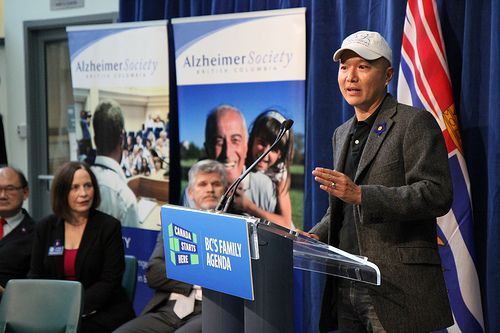Virtual Tour Of Dementia Lets People Experience Sensory Impairment: Tunnel Vision, Pins And Needles, And Constant Background Noise

"My experience of having dementia for eight minutes felt like how I imagine being subjected to torture would — isolating, debilitating and extremely distressing," Emma Lowe said after taking her virtual tour of dementia. She wore dark-tinted glasses, headphones, and special gloves, which simulated the day-to-day experiences of neurological disorders like Alzheimer's.
These virtual tours have begun proliferating around the country, most recently in England, following the recent patent approval for Virtual Dementia Tour — the commercial system of neurological disorder simulation invented by American inventor P.K. Beville. The tour endows users with the ability to hear, see, and feel similar to how real dementia patients would interact with their own environment.
The process begins with the equipment. Specially designed headphones, glasses, gloves, and inner soles distort the user's perception, impairing his or her ability to perform otherwise simple tasks. The headphones emit a constant background noise to cloud a person's thought process. The glasses only allow tunnel vision. The gloves, which look like ordinary gardening gloves, inhibit a person's sensitivity to touch. And specialty soles in the user's shoes create a sensation of pins and needles. Together, these impairments make basic tasks, like pouring a glass of water, nearly impossible.
"My senses were heightened and I couldn't hear myself think because of the constant noise which was played in my ears," Lowe, 24, said. "The most striking thing to me was the sounds of moving traffic which made me jumpy and the sirens which frightened me. I could hear a dripping tap, footsteps and a constant muffle made me unable to concentrate on anything."
Over the eight-minute tour, participants such as Emma Lowe were given a set of instructions, which they had to complete: read the instructions aloud, pour a glass of water, tie a tie, pair socks, and write a note. Even the easiest of tasks, sorting socks, became grueling and detached from reality.
"I found myself attempting to pair socks sat in and among a pile of clothes on the floor because my feet prickled and I couldn't see. Baffling as it may seem, at the time it made more sense to me to throw all the clothes on floor to search for pairs of socks," Lowe, who said she struggled around the room looking for a safe place to sit, reported afterwards. "When asked to clear the table again I popped things on the floor as it seemed logical. I was later told that healthy adults would never dump clothes on the floor."
Glenn Knight, managing director of Training 2 Care Ltd, which owns the UK license of the product, hopes the Virtual Dementia Tour creates awareness in family members whose relatives suffer from, or have suffered from, debilitating neurological diseases. Knight says he'd like England's Prime Minister, David Cameron, to give the product a try.
"David Cameron keeps saying that we need to improve understanding and care provision for people with dementia. We want the Prime Minister to let us come to number 10 and put him through the tour," Knight said referring to the address of the Prime Minister's office, as it "gives you a window into the world of those suffering with dementia. It truly is an unusual, emotional and very thought-provoking experience."
Estimates suggest 5.1 million Americans are have been diagnosed with Alzheimer's disease, the most common cause of dementia in the elderly. There is no known cure for the disease, nor other more serious forms of dementia, which can be recognized by loss of cognitive function — memory, thought, and reason — and the physical impairments we consider so essential to daily life, even as basic as pouring a glass of water or sorting our socks.
"It is really up to us," Beville said. "As our society grows we need to grow and mature with dementia, and that means we are the ones that have to change."
"The thing about dementia is it is not something that just strikes a person, it strikes a family, the people who care for the family and their children," she continued, "It affects everyone."
Published by Medicaldaily.com



























